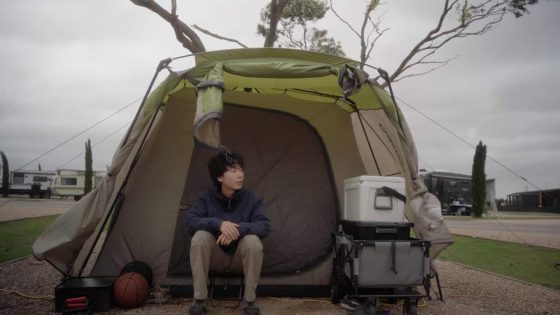Key Points
- The cost-of-living crisis is forcing some migrants and students to think about alternative types of accommodation.
- Living in tents has helped some migrants and students save on weekly expenses.
- Some Chinese students in Australia have skipped Lunar New Year festivities with family to secure accommodation ahead of the upcoming university semester.
A tent seems an odd place for an international university graduate to sleep in at night, especially given Chinese families commonly spend upwards of a quarter of a million dollars sending their children abroad for an Australian education.
But when RMIT media graduate, Dezu Hu, found his first job as an entry-level videographer in Tailem Bend, a rural town 85 kilometres south-east of Adelaide, nearby areas either lacked rental units or houses or were too expensive.
Hu said commuting for two hours between his shared flat in Adelaide to his workplace had exhausted him while his monthly $1,000 fuel bill had become too costly.
Soon he said he began parking his 2006 Subaru Forrester at his workplace and sleeping in the back.
But when the noise of passing traffic became too much to handle, he said he spotted a caravan park next door to this workplace and for $90 per week, proceeded to pitch a six-person tent on a campsite.
A simpler life: Dezu Hu says the caravan park he’s staying at has all the facilities he needs, including a communal kitchen. Source: Supplied
“When it’s stormy, the whole tent shakes and blows out of shape. It’s super noisy and your face gets slapped (by the tent flaps) when you’re sitting inside,” he said.
But Hu said he wouldn’t have it any other way.
I’ve always admired this lifestyle. My cost of living (now) is less than what I (previously) paid for petrol weekly.
Dezu Hu
When Hu first arrived in Melbourne as an international student in 2018, he said he remembered being startled by the “ridiculously expensive” available student accommodation.
The 405,000 student visas that financial year. Now, there are more than 650,000 international students studying in Australia.
For years, Australia has , viewing them as important revenue raisers for its universities and a major boost ($40 billion) to the nation’s economy.
But despite their significant economic and social contributions to Australia, say migrants including foreign students have more recently reported feeling “scapegoated” for causing the nation’s housing shortage and affordability woes.
Federation of Ethnic Communities’ Councils of Australia board member, Andrew Ng, said poor policy, not migrants, was to blame.
“Tax exemptions such as negative gearing leads to higher housing prices. But punishing investors with higher taxes will impact the delivery of new housing supply,” Ng told SBS Chinese.
In Sydney’s south, Hurstville Real Estate property manager Stella So has been experiencing a busy start to the year acting on behalf of renters and landlords in a tight market.
Federation of Ethnic Communities’ Councils of Australia (FECCA) board member, Andrew Ng (far L), said government policy should be blamed for the nation’s housing crisis, not migrants. Source: Supplied
“Landlords are increasing their rent to existing tenants by about 14 per cent. But if they’re new tenants, rents are increasing by more than 20 per cent,” So said.
She said Chinese international students had been trying to secure private rental accommodation as early as December with some skipping this year’s Lunar New Year celebrations, usually spent with close family in China, to try to circumvent the fierce competition.
“Landlords don’t seem to be worried about the rental (price) at all because they have that many people vying for their properties,” she added.
Chinese migrant, Liu Xiaohan, said she didn’t believe the government was addressing the root causes of the housing problem.
Reducing immigration should be the last resort.
Liu Xiaohan
Prior to the pandemic and faced with rental pressure, Liu said she and her partner had also had to resort to living in a tent at one time.
They’ve since bought a small house in Stanthorpe, a rural Queensland town of 5,000 people, with money they had earned and saved while pet-sitting on the Gold Coast.
Population growth is not the root cause of the problem … it’s the inadequacy of infrastructure.
Liu Xiaohan
Chinese migrant Liu Xiaohan chose to live in a tent when faced with high housing costs and a saturated employment market in 2018. Credit: supplied
Away from the bright city lights, competition for housing and the sting of paying high prices are realities Hu said he was thankful he no longer needed to navigate.
“The moment I said goodbye to my housemates and left my rental accommodation for the caravan park … I felt so free,” he said.
Hu’s campsite fee includes access to communal spaces such as a games room, laundry and kitchen where he is often found boiling instant noodles for his meals.
Downtimes were spent exercising alone or with other campers on a basketball court within the campsite ground.
“I can (also) just sit there, enjoy the breeze and listen to music while reading a book,” he said.
When it rains, he said he often ended up with a saturated sleeping bag and condensation, but at other times, he enjoyed dozing off to the sounds of torrential rain.
Despite the closer encounters with nature, Hu said he was relishing in his new frugal lifestyle.
“I no longer desire to buy lots of things because there’s also nowhere to put them. You think about your space, what’s needed and there’s not much,” he said.
“For me, I don’t think I could live this way forever. But it’s worth a try.”





